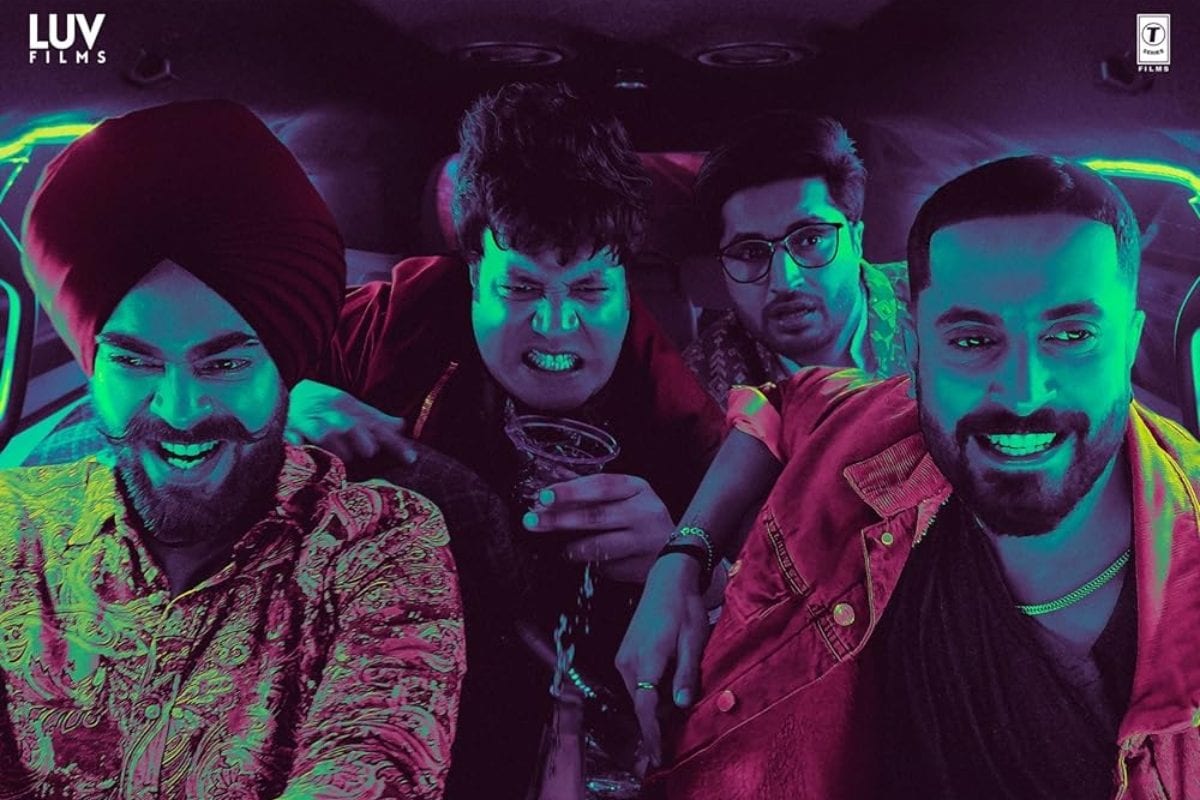It’s been a while since we last saw a breakup comedy saga and that’s where Sandeep Jain, Luv Ranjan and Harman Wadala’s written Wild, Wild Punjab comes into fore. Partly funny, partly problematic, this story of four men and three women takes many whacky turns to keep you entertained. While not devoid of clichés, the film starring Sunny Singh, Jassie Gill, Varun Sharma, Manjot Singh, Patralekha and Ishita Raj runs on the same outdated formula that we’ve seen in films like Hangover and Bachelor’s Night and yet the characters and the setting in Punjab makes it refreshingly new and unique.
‘Wild Wild Punjab’ begins by introducing us to an intriguing cast. Maan Arora (Sunny Singh) is a quintessential casanova, helplessly falling for every woman he encounters. In sharp contrast, we meet Gaurav Jain (Jassie Gill), a quiet soul who has never dared to challenge his father or even raise his voice. Completing this eclectic trio is Rajesh Khanna (Varun Sharma), a man hopelessly fixated on a woman whose affections lie elsewhere. But that’s not all, the trio is joined by their fourth friend, Honey Singh (played by Manjot Singh), a Sardar who owns a fleet of trucks and honors his father’s legacy by having his portrait drawn on all the vehicles. He is fiercely protective of his SUV car, whom he calls Paro affectionately.
Together, they set out on a road trip from Patiala to Pathankot with the determined mission of helping Khanna move on from his cheating ex-girlfriend by crashing her wedding. However, this journey is anything but ordinary, with unexpected twists: one of them ends up getting married overnight while drunk, another has a run-in with a group of arrogant policemen, and one of them falls for a sassy woman who also happens to be a drug dealer.
As the story unfolds, ‘Wild Wild Punjab’ takes us on Varun’s rollercoaster journey of trying to move on from his ex, with the unwavering support and humor of his friends. This isn’t just a typical narrative of heartbreak and recovery though – it’s enriched with the lively and unique essence of Punjab, turning it into a quirky, heartwarming adventure that promises to leave a lasting impression. At the same time, the screenplay is peppered with sexist and misogynistic overtones, with women of the movie being portrayed as either an accessory to their male counterparts or being subjects of male gaze.
In a particular scene en route to Pathankot, Gaurav, Maan, Rajesh, and Honey unexpectedly crash another wedding in pursuit of satisfying their alcohol cravings. As their attention is drawn to the bride and groom, Maan, known as the group’s playboy, provocatively remarks, ‘Tere Bhai Ne Aaj Tak Kabhi Kisi Dulhan Ke Saath Nahi Kia’ (Your brother has never been with a bride before). At a different instance, Maan humorously describes girls as ‘stretchable and flexible’. Such dialogues and scenes are scattered throughout the film, potentially creating an uncomfortable viewing experience for some.
During their sojourn across Punjab, these four friends leave chaos in their wake. From Khanna urinating on a toll checkpoint and igniting his bodily fluid to evading a group of drug dealers with a chaotic gunfight that results in a bullet hitting Khanna’s rear end, their unexpected trip to a hospital that turns out to be a veterinary clinic—a comedic trope found in many Hindi films. This movie, directed by Simanpreet, employs comic scenarios reminiscent of movies like ‘The Hangover’ and ‘American Pie,’ but the execution varies, delivering a mixed bag of hits and misses.
While the film does manage to elicit laughter in some scenes, the toxic machismo interspersed within the story hinders the impact to a large extent. The tone of the film and the camaraderie among our four lead characters is anything but a trademark of buddy comedy. It leans more towards a crass humour that some may find funny.
Varun Sharma as Rajesh Khanna infuses authenticity in his character, owing to his previous experience of playing similar characters before–a naive, good-at-heart but raucously loud guy. Sunny Singh is convincing as Maan Arora, a typical casanova whose staple diet is casual sexism. Manjot Singh as Honey Singh is brilliant, as he balances his ethical standpoints with that of the crisis at hand. He is that friend of the group who goes to any extent to help his friends out–in this case, transporting Khanna to his ex’s wedding so he could tell her off. Jassie Gill as Gaurav Jain is remarkable, since that character is visibly subdued and reserved compared to the other three but manages to bring quirkiness and subtlety to the story.
On the other hand, Patralekhaa, an otherwise brilliant actress seems to be caged within the boundaries of her ‘homely’ and ‘sanskari’ character Radha. There’s not much to her portrayal other than tagging along with the group and becoming a part of their mission. Even Ishita Raj’s character Meera is steeped in stereotypes of a bold, short-tempered and unbothered girl, almost a contrast to Patralekhaa’s character. And then there is Gopal Dutt, who plays Gaurav Jain’s father and whose story track with spm Gaurav Jain leads to a dead end, as if it was wistfully forgotten by the writers.
Ultimately, Wild Wild Punjab lives up to its name in terms of wildness but the script falls short. The humor may hit or miss depending on individual preferences, yet it offers nothing particularly groundbreaking. It primarily unfolds as a frivolous tale of brotherhood, marred by instances of misogyny and sexism, providing light-hearted entertainment for those seeking a mindless bromance flick.
